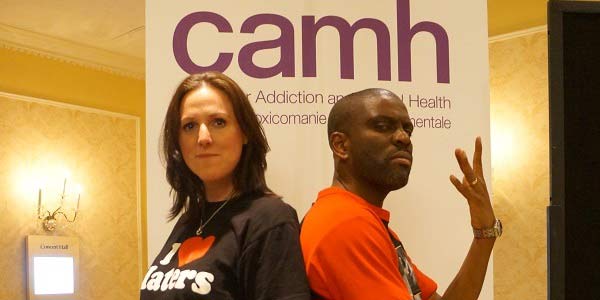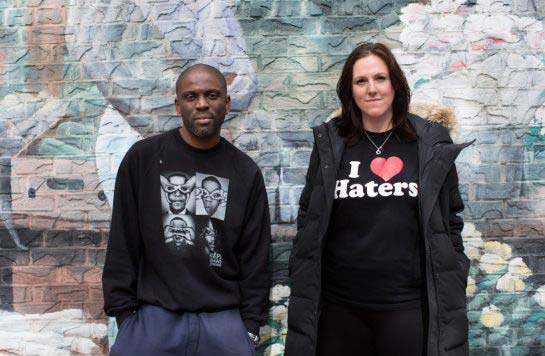Inspiration and innovation can come in many forms and through seemingly divergent avenues.
For Cambridge University’s Dr. Akeem Sule and Dr. Becky Inkster, common ground was found in psychiatric research, but it was a love for music that truly inspired them to work together on an eclectic yet esoteric project. And so Toronto’s Royal York Hotel played host to a unique event as part of the World Congress of Psychiatric Genetics, as the pair spoke to a diverse crowd of psychiatrists, researchers, musicians, dancers, people with lived experience and urban music aficionados.
Together, Dr. Sule and Dr. Inkster form the duo behind Hip Hop Psych – a project meant to raise awareness for mental health and make it accessible to youth and the general public. Over the course of a few hours, and with the help and support of CAMH’s research communications team and Dr. Jim Kennedy on the mic, they weaved through storylines relating to mental health.
As Toronto rapper Maestro Fresh Wes famously proclaimed, “This is a throwdown. A showdown. Hell no, I can’t slow down… It’s gonna go down.”

It Was Written
Dressed in a baggy pair of shorts, a pair of retro Air Jordans and sporting a shirt proclaiming “I (heart) haters”, Becky Inkster was first on stage. However, this wasn’t a rap battle but a dissection of thematic ideas in popular hip hop songs. Using West Coast rapper Kendrick Lamar’s ‘Swimming Pools’ from his album good kid, m.A.A.d city, Dr. Inkster drew parallels between the lyrics and language used to illustrate issues of substance abuse, peer pressure, depression, anxiety, and resilience.
Low End Theory
Akeem Sule was next on the mic, but instead of explaining multiple concepts related to addiction and mental health, he used the Eminem song ‘Stan’ as a basis for a mock psychoanalysis of the character the song was named after. By examining the verses, the words used, and the increasing intensity of language and tone, Dr. Sule provided a succinct psychiatric evaluation using the ICD system of classification (The UK uses ICD instead of the DSM, or the Diagnostic and Statistical Manual of Mental Disorders,that we’ve adopted in America).
Dr. Sule’s love for the music came through many times, as he excitedly exclaimed the phrase, “Bars man, BARS!” – slang for the bars or lines of verse that Eminem artfully connects to build out this imaginary character’s life and unfortunate circumstances.
Reasonable Doubt
Some may be perplexed by this seemingly random amalgamation of ideas, but there is a connection.
“Hip-hop and mental health have a lot more in common than meets the eye,” wrote Becky and Akeem in a recent blog. “Hip-hop culture embraces self-expression and recognizes the daily trials and tribulations that many people face – the pressures that challenge their state of mind.” It was this self-expression that formed the basis for Akeem’s portion of the presentation, and was also a testament to the power of storytelling that is sadly overlooked by a lot of popular music listeners.
And there is an audience for this type of analysis.
“We published an innovative article in The Lancet Psychiatry entitled ‘Kendrick Lamar, street poet of mental health’ that went viral across the world – gaining more than 1.4 million Facebook shares in less than 72 hours.”
If You’re Reading This, It’s Too Late
While it may be too late to catch them live, Drs. Sule and Inkster of Hip Hop Psych are busy publishing papers, and giving similar talks and interviews around the world. It’s their hope that listeners will be critical of the storytelling and wordplay in the songs we listen to, regardless of genre. “You will walk away realizing that some of the songs and artists you love (or hate!) actually contain deep and powerful messages about mental health.”
And while not all of us are able to provide the deep analysis they can, critical thinking around music “is empowering and will hopefully inspire you to share what you’ve learned and relate what you’ve learned to your own situation and well-being.”
Note: The section headers are all names of popular hip hop albums.
Link: Straight Outta Cambridge
Genre focuses on mental health, addiction and overcoming struggles, say rap-loving psychiatrist and neuroscientist

The lyrics of hip hop greats are filled with imagery about mental illness, addiction and overcoming struggles — from musings on the dangerous power of alcohol in Kendrick Lamar’s 2012 song “Swimming Pools,” to the portrait of an obsessive fan in Eminem’s 2000 track “Stan.”
With that connection in mind, two rap-loving researchers have launched Hip Hop Psych, a mental health awareness initiative using the genre for anti-stigma campaigns and outreach work in prisons, schools and youth hostels.
The pair have written about the connection between hip hop and mental health and drug culture for major medical journals such as The Lancet and the Journal of Public Mental Health — and recently appeared in Toronto for an event sponsored by the Centre for Addiction and Mental Health, merging music and mental-health awareness.
The Star spoke to psychiatrist Dr. Akeem Sule, based out of the Cumbria and South Essex NHS Trusts in the U.K., and Canadian neuroscientist Dr. Becky Inkster, a University of Toronto grad who’s now working in the psychiatry department of the University of Cambridge, about how the genre can help break down stigma and open people’s eyes to the world of mental health.
What, exactly, is Hip Hop Psych all about?
AS: When you look at the origins of hip hop, you find out it happened in south Bronx at a time when there was economic collapse and the plight of African-Americans and Hispanics was really bad. But out of this same culture came a multibillion-dollar industry. What Becky and I believe is that, when you look at the hip hop lyrics, you can actually see snippets of mental-health problems — but also look at resilience.
BI: It’s often really difficult to get these medical messages across. There’s so much research and knowledge out there, but it falls short of actually reaching the people. This is such a different, unique way of delivering the information in a way people can relate to.
What does your outreach work look like?
AS: Our outreach work has involved prisons, where we dissect lyrics which have a focus on resilience. We talked to the prisoners and identified lyrics which we dissected with emphasis on resilience (eg. positive visual imagery, cognitive reframing.) We also talked about mental-health problems highlighted in the lyrics … the prisoners felt able to open up about mental-health problems they had been experiencing in a way that would not have been possible if hip hop lyrics were not used.
So what’s special about hip hop? Why this versus another genre?
BI: It tends to be really raw in terms of the message. So it doesn’t sugar coat anything and the message comes from the heart. It’s often about socio-political struggles, self-expression, equality, fighting for what you deserve.
AS: It kind of focuses on the underdog, the underclass. What could be more relevant? Hip hop is really good at reaching hard-to-reach communities.
Some stories have suggested your work is all about hip hop being a “cure” for depression, or a “therapy” for mental illness. But that’s not the case, right?
AS: Just to make it clear, we’re public health campaigners. It’s like an anti-stigma campaign. It fits with what’s happening in Canada at the moment — the Mental Health Commission of Canada said you can’t sit down and do nothing. Public health education and anti-stigma campaigns should be at the forefront of any mental health intervention in Canada.
Some critics question the violent imagery and drug use detailed in many hip hop lyrics. What’s your response to that?
BI: If someone is surrounded by an environment with drugs — a toxic environment — why wouldn’t you talk about these issues? It goes back to freedom of expression. It’s a way of trying to cope and turning it into a positive.
AS: There is also an underground hip hop movement. If you want socially conscious hip hop, it’s there. You just need to check, rather than looking at chart music.
What types of psychiatric disorders come up in hip hop lyrics?
AS: Man, everything. Depression, schizophrenia, bipolar disorder, borderline personality disorders, drug addictions, post-traumatic stress disorder. If you can think of any DSM-5 psychiatric disorder, you can bet it’s come up in hip hop.
BI: But it’s not just about people who have been diagnosed. We want to get away from this classification of them, us, the other. It’s about your own well-being and knowing your own family situation, and it’s about coping strategies and educating the public.
It’s about aspirations. There is some interesting research about people having future-positive visual imagery. In this track, Biggie’s actually doing that. It’s a way of developing resilience and protecting yourself from depression.— Dr. Akeem Sule
If you hear it, it sounds like a horrible, horrible message about alcohol misuse. It’s actually about a kid going through hard struggles and trying to make the right decisions while his environment, and pressures around him, are fighting against him.— Dr. Becky Inkster
“Stan” is very interesting, because you see all kinds of materials covered, from attachment difficulties at a young age to the implications of self-harm and drug addiction. There’s family disruption and how it can affect adult mental-health problems.— Dr. Akeem Sule
Link: Hip Hop Psych raising awareness about mental health through music